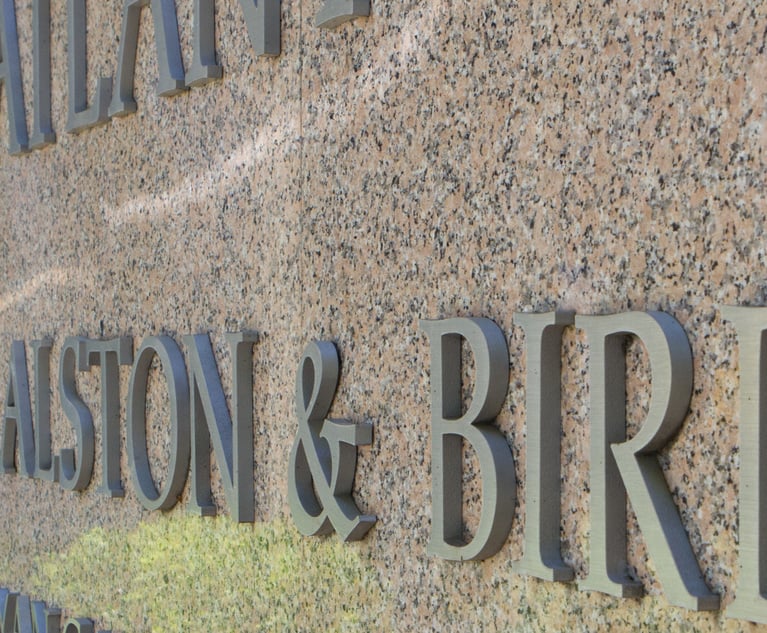 Attorney Gary Coulter in the documentary “Mr. Dial has Something to Say.” (Photo: YouTube)
Attorney Gary Coulter in the documentary “Mr. Dial has Something to Say.” (Photo: YouTube)Athens Lawyer Disbarred Over Representation of Renowned Art Collector
The Georgia Supreme Court overrode recommendations to suspend the bar license of Athens attorney Gary Coulter, choosing instead to disbar him over multiple ethics infractions.
June 18, 2018 at 03:58 PM
6 minute read
Athens attorney Gary Coulter was disbarred Monday by the Supreme Court of Georgia over how he handled Southern folk art collector and promoter Bill Arnett's legal and business affairs.
The high court said Coulter administered more than $1 million of Arnett's funds using 12 different bank accounts he established but failed to keep records for them. None of the accounts were trust accounts, the high court's unsigned opinion said.
In addition, Coulter at one point stockpiled more than 100 pieces of art valued at more than $850,000 in his unsecured law office, allegedly as collateral for unpaid legal fees, the high court said.
Arnett discovered and is credited with creating a market for Southern folk artists that included Thornton Dial. The artwork at issue in Arnett's bar complaint was by Dial, according to papers filed in the disciplinary case.
In disbarring Coulter, the high court rejected a recommendation from a special master to suspend Coulter's bar license for four years. That recommendation was made by Drew Eckl Farnham partner Sandra Cho, whom the bar appointed to review the complaint.
Justices Carol Hunstein, Harold Melton, Michael Boggs and Keith Blackwell dissented without comment.
The disbarment marked the second time the bar recommended disciplinary action against Coulter for his representation of Arnett.
The high court unanimously rejected a special master's recommendation last year to accept Coulter's voluntary petition to suspend his license for two years.
Atlanta attorney Linley Jones, who filed the bar complaint against Coulter on Arnett's behalf six years ago, celebrated the ruling Monday.
Jones said she filed the complaint because Coulter was “taking money for outrageous amounts of unearned legal fees” from Arnett, who over time had entrusted the attorney with handling many of his financial matters.
In addition, Coulter “had set up multiple accounts that appeared to be established in order to conceal that,” Jones explained. More than 100 works of art belonging to Arnett migrated from an art warehouse to Coulter's law office without Arnett's knowledge, she said. Coulter had access to that warehouse.
The opinion noted that Coulter secured $850,000 in artwork as collateral for what he claimed were legal fees. Coulter acknowledged in disciplinary filings that the artwork was all done by Dial and that pieces were to cover owed and future fees.
The artwork was eventually recovered from Coulter, Jones said.
Arnett trusted Coulter “and should have been able to trust him,” Jones said. “He was a lawyer with fiduciary obligations. Mr. Arnett never questioned that he [Coulter] was acting against his best interest.”
Jones said Coulter's disbarment was particularly gratifying, as it came on the heels of the New York Metropolitan Museum of Art's opening for an exhibition for paintings Arnett originally acquired and that became part of an extensive collection held by the Souls Grown Deep Foundation Arnett established.
That exhibition, “History Refused to Die,” opened May 22 and includes more than 30 paintings, sculptures, drawing and quilts that Souls Grown Deep donated to the Met.
“It was a remarkable turn of events,” said Jones, a member of the foundation's board. “We are glad to finally see justice served.”
Coulter could not be reached for comment. In formal responses filed during the bar investigation, Coulter said Arnett typically owed him “substantial sums” of unpaid fees.
Coulter said he and Arnett “had constant communications regarding how the unpaid invoices would be paid, secured or protected,” and that Arnett “occasionally” gave him authority to make partial payments to the law firm through Arnett's accounts.
Arnett's art sales “supported the payments made to the law firm,” Coulter contended, adding that the payments were sometimes negotiated as percentages from specific sales.
Coulter did acknowledge that, after 2008, he did not mail billing statements or invoices to Arnett, did not keep complete records of all of Arnett's funds and “did not always promptly notify the Arnetts of my receipt of funds in which one or more of them had an interest.”
According to Monday's ruling, Coulter first represented Arnett in a landlord-tenant dispute and a personal tax matter in 2003. He also represented Dial and Arnett's late wife. Coulter's representation of Arnett subsequently expanded to include dozens of Arnett's personal and business matters, including depositing, transferring and disbursing Arnett's funds in connection with a number of his businesses.
According to the ruling, while Arnett knew of some of the accounts Coulter opened on his behalf, he was unaware of others, including accounts where Coulter was the sole signer.
“Coulter concedes these accounts were not approved lawyer-trust accounts and that they held only funds related to the client and his businesses, yet Coulter transferred funds from or through [Arnett's] accounts to his operating account as payment of attorney fees,” the opinion said.
In 2011 alone, Coulter handled more than $1 million belonging to Arnett using 12 different bank accounts. That was more than half of Arnett's annual revenue, according to the opinion. Coulter then paid himself over $400,000 in fees from those accounts but failed to provide Arnett with any billing invoices for work allegedly performed after 2008.
In 2011, two of Coulter's former associates printed a set of invoices from the firm's billing system and gave them to Arnett, the opinion said. Those invoices “contained substantial discrepancies that Coulter could not explain,” the opinion said. The two associates also filed bar complaints against Coulter, which were resolved, along with Arnett's, by Coulter's disbarment.
Coulter's disbarment is the third time he has faced disciplinary action by the bar and the high court. Coulter received a letter of admonition in 2003 and was given a public reprimand in 2017.
This content has been archived. It is available through our partners, LexisNexis® and Bloomberg Law.
To view this content, please continue to their sites.
Not a Lexis Subscriber?
Subscribe Now
Not a Bloomberg Law Subscriber?
Subscribe Now
NOT FOR REPRINT
© 2024 ALM Global, LLC, All Rights Reserved. Request academic re-use from www.copyright.com. All other uses, submit a request to [email protected]. For more information visit Asset & Logo Licensing.
You Might Like
View All

Lewis Brisbois Attempts Revamp After Mass Defections, Email Scandal

A 'Shocking Opinion'?: 'Duty to Defend' Under Fire in Ga. Court of Appeals Opinion
Trending Stories
- 1'Largest Retail Data Breach in History'? Hot Topic and Affiliated Brands Sued for Alleged Failure to Prevent Data Breach Linked to Snowflake Software
- 2Former President of New York State Bar, and the New York Bar Foundation, Dies As He Entered 70th Year as Attorney
- 3Legal Advocates in Uproar Upon Release of Footage Showing CO's Beat Black Inmate Before His Death
- 4Longtime Baker & Hostetler Partner, Former White House Counsel David Rivkin Dies at 68
- 5Court System Seeks Public Comment on E-Filing for Annual Report
Who Got The Work
Michael G. Bongiorno, Andrew Scott Dulberg and Elizabeth E. Driscoll from Wilmer Cutler Pickering Hale and Dorr have stepped in to represent Symbotic Inc., an A.I.-enabled technology platform that focuses on increasing supply chain efficiency, and other defendants in a pending shareholder derivative lawsuit. The case, filed Oct. 2 in Massachusetts District Court by the Brown Law Firm on behalf of Stephen Austen, accuses certain officers and directors of misleading investors in regard to Symbotic's potential for margin growth by failing to disclose that the company was not equipped to timely deploy its systems or manage expenses through project delays. The case, assigned to U.S. District Judge Nathaniel M. Gorton, is 1:24-cv-12522, Austen v. Cohen et al.
Who Got The Work
Edmund Polubinski and Marie Killmond of Davis Polk & Wardwell have entered appearances for data platform software development company MongoDB and other defendants in a pending shareholder derivative lawsuit. The action, filed Oct. 7 in New York Southern District Court by the Brown Law Firm, accuses the company's directors and/or officers of falsely expressing confidence in the company’s restructuring of its sales incentive plan and downplaying the severity of decreases in its upfront commitments. The case is 1:24-cv-07594, Roy v. Ittycheria et al.
Who Got The Work
Amy O. Bruchs and Kurt F. Ellison of Michael Best & Friedrich have entered appearances for Epic Systems Corp. in a pending employment discrimination lawsuit. The suit was filed Sept. 7 in Wisconsin Western District Court by Levine Eisberner LLC and Siri & Glimstad on behalf of a project manager who claims that he was wrongfully terminated after applying for a religious exemption to the defendant's COVID-19 vaccine mandate. The case, assigned to U.S. Magistrate Judge Anita Marie Boor, is 3:24-cv-00630, Secker, Nathan v. Epic Systems Corporation.
Who Got The Work
David X. Sullivan, Thomas J. Finn and Gregory A. Hall from McCarter & English have entered appearances for Sunrun Installation Services in a pending civil rights lawsuit. The complaint was filed Sept. 4 in Connecticut District Court by attorney Robert M. Berke on behalf of former employee George Edward Steins, who was arrested and charged with employing an unregistered home improvement salesperson. The complaint alleges that had Sunrun informed the Connecticut Department of Consumer Protection that the plaintiff's employment had ended in 2017 and that he no longer held Sunrun's home improvement contractor license, he would not have been hit with charges, which were dismissed in May 2024. The case, assigned to U.S. District Judge Jeffrey A. Meyer, is 3:24-cv-01423, Steins v. Sunrun, Inc. et al.
Who Got The Work
Greenberg Traurig shareholder Joshua L. Raskin has entered an appearance for boohoo.com UK Ltd. in a pending patent infringement lawsuit. The suit, filed Sept. 3 in Texas Eastern District Court by Rozier Hardt McDonough on behalf of Alto Dynamics, asserts five patents related to an online shopping platform. The case, assigned to U.S. District Judge Rodney Gilstrap, is 2:24-cv-00719, Alto Dynamics, LLC v. boohoo.com UK Limited.
Featured Firms
Law Offices of Gary Martin Hays & Associates, P.C.
(470) 294-1674
Law Offices of Mark E. Salomone
(857) 444-6468
Smith & Hassler
(713) 739-1250







